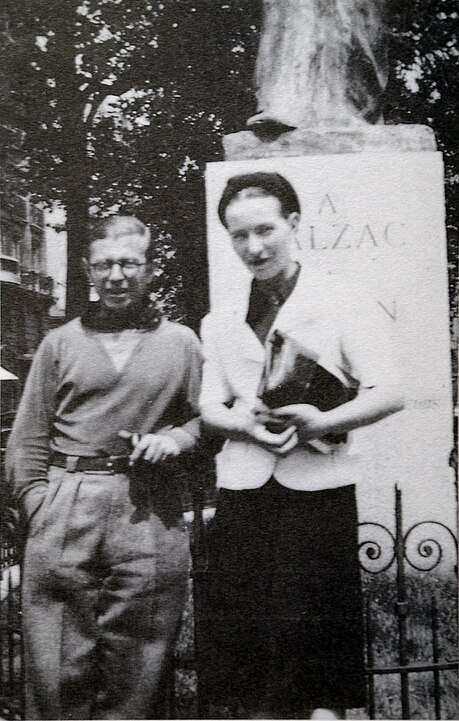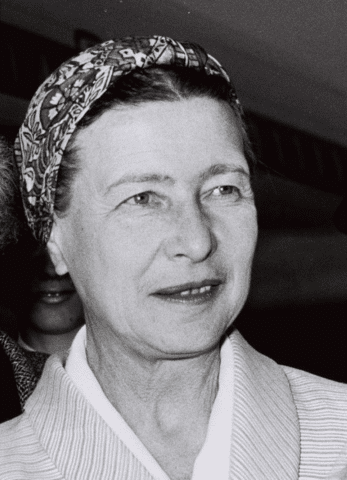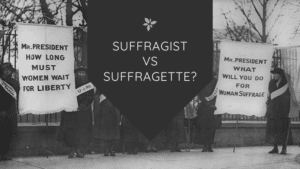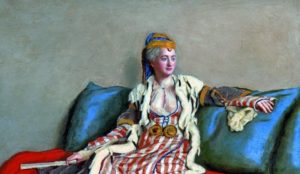French writer and philosopher Simone de Beauvoir is most famous for her 1949 book The Second Sex. She had a significant impact on the development of modern feminist theory, though she never considered herself a philosopher and didn’t call herself a feminist until later in life. In regard to her own work she called herself the “midwife of Sartre’s existentialism,” and her contemporaries often considered her work only an echo of her lover Jean-Paul Sartre’s. Scholars have now begun to acknowledge that she was a pioneer in the fields of existentialism and feminist theory in her own right.
Life of Simone de Beauvoir

Simone de Beauvoir was born in Paris in 1908. Her mother was a devout Catholic, and Simone also grew up very religious until she was 14. At that point she experienced a crisis of faith, refused to go to mass again, and considered herself an atheist thereafter.
Her family noted that she was precocious even as a child. Her father once boasted of her, “Simone thinks like a man!”
Since her family had no money for a dowry, she had to earn her own income and decided to study mathematics at the Institut Catholique and literature at the Institut Sainte-Marie. She then studied philosophy at the University of Paris and sat in on several courses at the Ecole Normale Superieure, where she met Jean-Paul Sartre. They began their lifelong relationship soon after.
Simone chose to never marry or have children, focusing instead on her education and career as a writer and philosopher. She and Sartre became well-known for their open relationship, which they talked about frankly in interviews and in their published writings and letters.
‘The Second Sex’ and Other Works

During her career Simone de Beauvoir wrote essays, novels, biographies, one autobiography, and monographs on a variety of issues. She and Sartre always reviewed each other’s work, and scholars debate over how much of an influence they had on each other.
Her best known works include two novels, She Came to Stay and The Mandarins, and her treatise The Second Sex.
The Second Sex was an immediate bestseller, selling 22,000 copies in the first two weeks of its publication in 1949. Written in French, the book analyzes the sources and causes of women’s oppression, creates a theory of feminist existentialism, and calls for a moral revolution.
Significance of Simone de Beauvoir

Though she didn’t give herself credit for being a philosopher in her own right, Simone de Beauvoir had a significant influence on the development of existentialism and feminist theory, as well as contributing to the fields of ethics, politics, and phenomenology.
Her book The Second Sex is considered foundational feminist literature and the spark that helped set off the second wave of feminism. The theories and ideas in the book influenced important texts in the feminist movement including Betty Friedan’s The Feminine Mystique (1963), Kate Millett’s Sexual Politics (1969), and Germaine Greer’s The Female Eunuch (1970).
Simone de Beauvoir Quotes
- “One is not born, but rather becomes, a woman.” (The Second Sex, 1949)
- “One is not born a genius, one becomes a genius; and the feminine situation has up to the present rendered this becoming practically impossible.” (The Second Sex, 1949)
- “I wish that every human life might be pure transparent freedom.” (The Blood of Others [Le sang des autres], 1946)
- “Self-knowledge is no guarantee of happiness, but it is on the side of happiness and can supply the courage to fight for it.” (Force of Circumstances Vol. III, 1963)
- “I tore myself away from the safe comfort of certainties through my love for truth — and truth rewarded me.” (All Said and Done, 1972)
Keri is a blogger and digital marketing professional who founded Amazing Women In History in 2011.






Leave a Reply